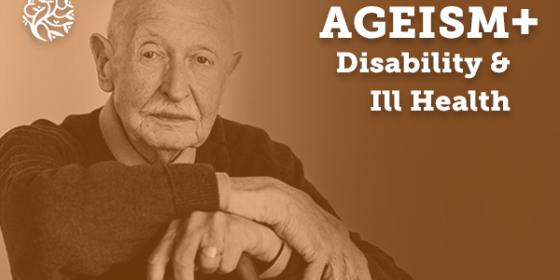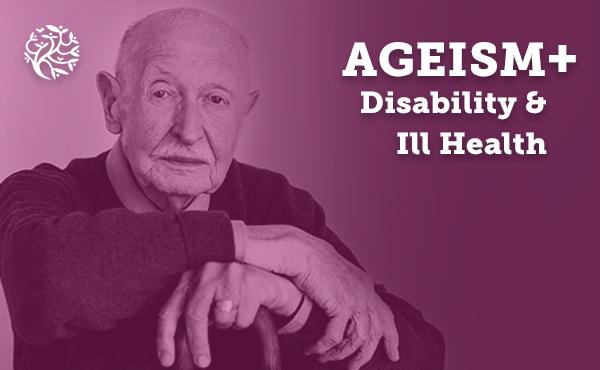 Growing older with HIV
Growing older with HIV
‘How we treat our old people is a crucial test of our national quality. A nation that lacks gratitude to those who have honestly worked for her in the past while they had the strength to do so, does not deserve a future…”
Older people with complex health conditions need integrated and patient-centred care, focusing on prevention and maintaining independence. Yet ageism, whether direct or indirect, flagrant or insidious can act as a barrier to providing accessible, age-attuned care services. Such unwarranted discriminatory attitudes and practice could be experienced at any point in an older person’s interaction with care services, but for reasons of space here we focus on actions taken to address barriers in relation to clinical trials, access to appropriate surgical interventions, and care at the end of life.
Enrolment into clinical trials
Developing treatment strategies becomes significantly more difficult when older people are excluded from clinical trials and other research. There are many challenges in recruiting older people to research studies, particularly randomised controlled trials. Study exclusion criteria and refusal rates are a major issue and the presence of cognitive impairment and ethical decisions adds complexity.
Concerns with study information and consent procedures are the most common reasons given for not participating in clinical trials. Understanding and weighing up the complex information about randomisation and control groups is not easy, particularly in the presence of sensory and cognitive impairment.
The healthcare we give to patients must be evidence-based, integrating the best available research, clinical expertise and patient’s preferences. Older people, particularly those with dementia - a high priority for National Institute of Health Research (NIHR) funding - use a high proportion of NHS resources due to their susceptibility to infection, co-morbidities and functional decline.
Researching this vulnerable group is challenging and an understanding of mental capacity, excellent communication skills and sensitivity are needed. But to provide the best possible care, it is essential we do this.
In the USA, this year the National Institutes of Health (NIH) sought to address unwarranted age exclusion by clarifying the research it is prepared to fund. Grant applicants will have to explain how they intend to include people of all ages, providing an acceptable rationale for any group they leave out.The UK NIHR has also recognised that frailty and older people with multiple co-morbidities represent both a challenge to existing models of healthcare and an opportunity for improvement.
It has an explicit themed call on complex healthcare and older people announced in 2017. The James Lind Alliance, too, has recognised the need to prioritise research initiatives in ageing to make sure that they focus on areas that the public, and care professionals, feel are priorities. The Dunhill Medical Trust exclusively funds academic and clinical research into the mechanisms of ageing and treating age-related diseases.
In recent years there has been a focus on ensuring patients receive the right intervention regardless of age
Access to surgery
Surgery is often conducted for degenerative disease (such as osteoarthritis requiring hip replacement), cancer, or vascular disease (such as an aortic aneurysm repair). All of these conditions are increasingly common in older people so it is no surprise that more and more older people are having planned or emergency surgery. Unfortunately older people have worse outcomes after surgery than younger people.
This is true whether we are looking at postoperative complications such as infections, acute confusion (delirium), or recovery. Interestingly this is not due to age itself but is a consequence of factors such as reduced physiological function, increased multi-morbidity and syndromes such as frailty and cognitive impairment, all of which increase with age.
Again, this is not surprising; a patient presenting with a combination of diabetes, high blood pressure, Parkinson’s disease and early dementia would be expected to do worse.
One of the concerns this raises is that older people may be less likely to be offered surgical intervention because clinicians may be worried about the risks of surgery and feel that these outweigh the benefits. There are lower than expected rates of cancer surgery in patients aged over 70 years, for example. But in recent years there has been a focus on ensuring patients receive the right intervention regardless of their age.
The patient must be a full participant in the decision on whether or not to undergo surgery, and must have a full understanding of the risks. A team based approach to older people with complex needs, with surgeons, anaesthetists and geriatricians being involved in risk assessment, and optimisation before surgery (making sure the patient is as fit as possible before surgery) has been demonstrated to improve outcomes.
Inspired by the work of clinicians at Guy’s and St Thomas’ Hospital in London, the British Geriatrics Society has a ‘Peri-operative Care of Older People Undergoing Surgery’ (POPS) special interest group to provide a forum for education and training in peri-operative medicine for medical and allied healthcare professionals. The group holds an annual conference, and its membership is open to both BGS members and non-members.
Traditional models of palliative care designed for younger people with a single terminal illness do not necessarily meet the needs of older people.
Care at the end of life
There is a lack of recognition that hospice and palliative care is appropriate for older people with frailty and multi-morbidity. We know that older people, even if they have cancer, are less likely to be offered hospice care. Older people living with frailty are very unlikely to receive such care.
Traditional models of palliative care designed for younger people with a single terminal illness do not necessarily meet the needs of older people. Many older people are admitted to hospital several times in their last year of life with treatment aimed at reversing the acute emergency, but with less attention to longer-term goals or individual priorities.
It is harder to predict when death will occur in older age than in cancer; older people often live for some time with several different healthcare conditions and a gradual decline in physical and mental function which may be missed or underestimated until a crisis occurs.
The BGS is working to promote a new vision of palliative care for older people which is holistic, personalised and involves those caring for the older person. Such care must be responsive in a crisis, offering appropriate medical intervention, multidisciplinary and integrated with social care.
Doctors, nurses and allied health professionals need more and better training opportunities in the specialist management of older people with complex needs. The broader healthcare workforce must acquire the right specialised skills and age-attuned working culture to provide appropriate care for this group, who make up the bulk of NHS and social care service users, so that the right mix of services is available in the right place at the right time. Such a transformation in health and social care is imperative if as a country we wish to add life to years, and not just years to life.
Visit the British Geriatrics Society website.
Have you been affected by any of these issues?
If you have been affected by any of the issues described in this blog, or simply need someone to reach out to, you can call Independent Age’s freephone helpline for information and advice on 0800 319 6789.
The views and opinions expressed in this article are those of the author and do not necessarily reflect the policy or position of Independent Age.
